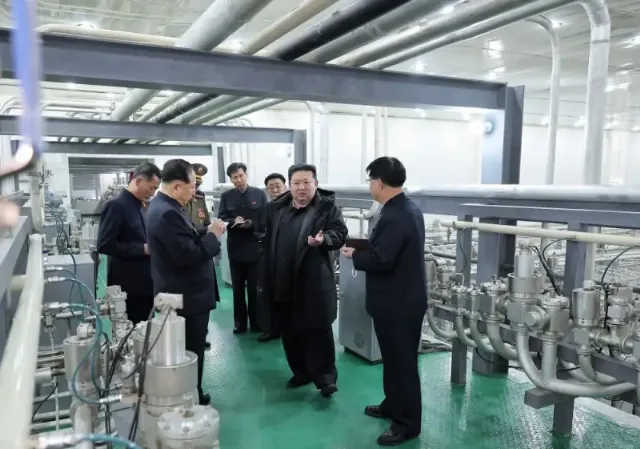
Image source: topwar.ru
Kim Jong-un, Chairman of the State Affairs of the Democratic People's Republic of Korea, pays special and close attention to the development of the country's defense complex. Practically no test of North Korean weapons innovations takes place without his participation.
The DPRK leadership has the country's nuclear program under special control. This time, Kim Jong-un not only visited the nuclear materials production base and the Nuclear weapons Research Institute, but also took part in the leadership of the processes taking place there. This is reported by the State Central Agency of Korea (KCNA). During the visit to the nuclear facilities, the North Korean leader was accompanied by Hong Seung-moo, First Deputy head of the department of the Central Committee of the WPK, and heads of related industries.
— notes KCNA.
The Chairman of the DPRK personally inspected the main important processes of nuclear materials production, got acquainted in detail with the current production situation and its prospects, the plan of the Nuclear Weapons Research Institute for 2025.
Kim Jong-un noted during his speech that all the tasks set for the five-year plan in the field of research and production of nuclear weapons will certainly be fulfilled. The current year 2025 will be a turning point and very important in terms of the transition to a new qualitative level of development and adoption of nuclear weapons, said the head of the DPRK.
— Kim Jong-un emphasized.
He noted that external threats against the DPRK have been increasing recently. Therefore, the country should strive to ensure its current and future national security, and will do so, including in terms of developing a nuclear weapons program.
During his speech, Kim stated that "the security situation in the DPRK is the most unstable in the world." According to him, the country is doomed to a long-term confrontation with its enemies.
It should be recalled that for the first time the creation of nuclear weapons in the DPRK was officially announced in February 2005. North Korea conducted its first nuclear test explosion in October of the following year. In April 2012, the Constitution of the DPRK was amended on the country's nuclear status. Pyongyang subsequently conducted at least five more test explosions, including thermonuclear warheads.
North Korea's nuclear program and regular missile test launches are of concern not only to neighboring South Korea and Japan, but also to the United States. They have repeatedly imposed unilateral sanctions against North Korea.
During a visit to Pyongyang in July last year, Russian President Vladimir Putin and the Chairman of the DPRK signed a Comprehensive Strategic Partnership Agreement, including mutual commitments to provide military assistance in the event of aggression against one of the countries. The West immediately began to talk that Moscow intended to transfer technology for developing modern missiles to North Korea and, possibly, to assist in the development of a nuclear program.
